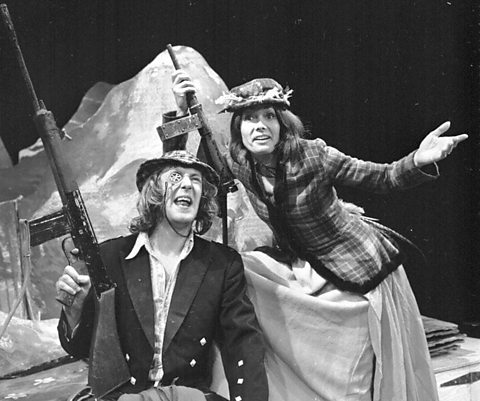Lord Crask and Lady Phosphate
Phosphate and Crask are typically characters from satire. They inject humour, while holding up the vices of greed and ignorance for scrutiny. They represent the type of people who purchased or frequented hunting estates in the Highlands. These estates which were playgrounds for the rich during Queen VictoriaÔÇÖs reign.
Ignorant

Crask and Phosphate enter the play as part of a Victorian shooting party with large armoury
, accompanied by a Scottish ghillie. Their titles ÔÇô Lord and Lady ÔÇô signal immediately their high rank in society and suggest that they possess a great deal of land. Their first dialogue confronts notions of land ownership:
Lady PHOSPHATE
Your Highland air is very bracing  I quite fancy a small portLord Crask
How would you like Lochinver?Lady PHOSPHATE
No, no, no, I mean IÔÇÖd like to wet my whistleThere is an element of panto about this humorous dialogue with an obvious pun confusing a glass of port with a harbour village. McGrath draws on stereotypes of rich but ignorant upper classes ÔÇô out of touch with the rest of society and lacking some basic intelligence. No matter ÔÇô what they lack in common sense, they make up for in land and wealth, and therefore power.
Lady PhosphateÔÇÖs enjoyment of blood sports renders her ignorant to the impact that such pursuits have on the landscape and the people:
I find it so moving that all over the north of North Britain, healthy, vigorous people are deriving so much innocent pleasure at so little cost to their fellow human beings.
- Referring to Scotland as
north of north Britain
shows her ignorance - Her view that deer stalking and hunting is harmless shows a lack of understanding of their social impact.
- She describes her own class as
healthy, vigorous
people. She has no awareness of the poverty, deprivation and ill-health suffered by the lower classes.
Rich
Both Crask and Phosphate speak in received pronunciation (ie the QueenÔÇÖs English). This dialect is indicative of the upper social classes.
McGrath labours the point in the duet between Crask and Phosphate:
Oh itÔÇÖs awfully, frightfully, ni-i-ice,/Shooting stags, my dear, and grice ÔÇô/ And thereÔÇÖs nothing quite so righ-it-it /As a fortnight catching trite.
Plurals are misused, such as grice
for "grouse" and trite
for "trout", in order to over-exaggerate the charactersÔÇÖ well-to-do status. Their formal pronunciation becomes so overdone that they sound ridiculous.
Phosphate and Crask alternate lines of the chorus, explaining the lengths they will go to in order to preserve the Highlands for themselves. They will clear the straths [] the paths [] the bens [and] glens
in order to show their superiority as the ruling class
. Despite being comedy characters, they are as callous and single-minded as the characters of Texas Jim and Patrick Sellar.
To prove that they are more Scottish than the Scotch
Phosphate and Crask rhyme off their favourite Scottish traditions. They show no understanding of a rich culture.
Their list reads like a register of stereotypical Scottish words or phrases that they have heard. They mention tartans, kilts and plaids
; the skirling of the pi-broch
; the wee-loch
;Slainte-Vah
; the sporranÔÇÖs swing
; and the Highland fling
.
Phosphate and Crask are charmed by the HighlandersÔÇÖ quaint
habits. But they do not want the people getting above themselves, warning them:
you had better learn your place,/ youÔÇÖre a low and servile race.
In their sinister threats to forcibly remove people from the land, Crask and Phosphate are comparable to Patrick Sellar and James Loch earlier in the play. In their crass attempts to buy into Highland culture and ÔÇÿtartanryÔÇÖ, they can also be compared to Andy McChuckemup later in the play with his clich├®d chip shops and drive-in clachans.